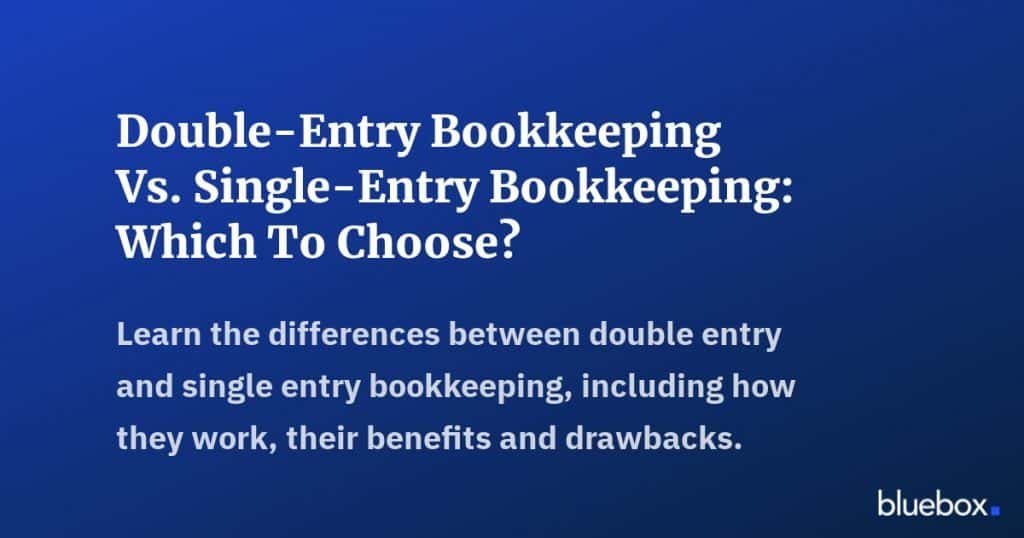When it comes to managing your business finances, there are two main accounting methods to choose from: double-entry bookkeeping and single-entry bookkeeping. While both approaches have their unique advantages and disadvantages, selecting the right one can significantly impact the accuracy of your financial records and, ultimately, the success of your business.
To help you understand the differences between the two methods and choose the right one for your business, we’ll dive deeper into each method below.
| Accounting Method | Double-Entry Bookkeeping | Single-Entry Bookkeeping |
|---|---|---|
| Principle | Every transaction has two equal and opposite effects on the company’s balance sheet. | Records each financial transaction once. |
| Number of accounts | Every transaction is entered into two accounts – a debit and a credit account. | Financial transactions are only recorded as a debit or credit to a single account. |
| Balance | The accounting equation is always balanced. Total debits are always equal to the total credits. | No double-entry system, which means that there is a higher risk of errors and inaccuracies. |
| Advantages | Provides a comprehensive financial picture, more easily detects and corrects errors and discrepancies. | Requires less time, knowledge, and skill to implement, less expensive for small businesses with limited financial transactions. |
| Disadvantages | More time-consuming and complex, may not be necessary for small businesses. | Higher risk of errors and inaccuracies, lack of accuracy and reliability. |
Double-Entry Bookkeeping: The Comprehensive Accounting Method
Double-entry bookkeeping is the gold standard of accounting and the most commonly used method by businesses worldwide. It is based on the fundamental principle that every financial transaction has two equal and opposite effects on the company’s balance sheet.
Under this method, every transaction is entered into two accounts – a debit and a credit account – to ensure that the accounting equation (assets liabilities + equity) is always balanced. This means that for every debit entry, there must be an equal credit entry, ensuring that the total debits are always equal to the total credits.
The Advantages of Double-Entry Bookkeeping
One of the most significant advantages of double-entry bookkeeping is its accuracy and reliability. Because every transaction is recorded twice, errors and discrepancies are more easily detected and corrected. Additionally, double-entry bookkeeping provides a more comprehensive financial picture of your business, which can help you make better decisions.
The Disadvantages of Double-Entry Bookkeeping
Double-entry bookkeeping can be more time-consuming and complex than single-entry bookkeeping, requiring more knowledge and skill to implement correctly. Additionally, this approach may not be necessary or appropriate for small businesses, which may only have a few financial transactions each month.
Single-Entry Bookkeeping: The Simplified Accounting Method
Single-entry bookkeeping is a simplified accounting method that records each financial transaction once, using a simple cash book or spreadsheet. This method is often used by small businesses or sole proprietors who have less complex financial records.
Under this method, financial transactions are only recorded as a debit or credit to a single account, and there is no double-entry system. This means that it is easier and faster to implement, but it also means that there is a higher risk of errors and inaccuracies.
The Advantages of Single-Entry Bookkeeping
The most significant advantage of single-entry bookkeeping is its simplicity and ease of use. It requires less time, knowledge, and skill to implement, making it ideal for small businesses with limited financial transactions. Additionally, it can be less expensive than double-entry bookkeeping because it requires fewer resources.
The Disadvantages of Single-Entry Bookkeeping
The primary disadvantage of single-entry bookkeeping is its lack of accuracy and reliability. Because transactions are only recorded once, there is a higher risk of errors and inaccuracies, which can lead to incorrect financial statements and poor decision-making.
Choosing the Right Accounting Method for Your Business
When it comes to choosing the right accounting method for your business, it’s essential to consider several factors, including the size and complexity of your business, the number of financial transactions you have each month, and your budget and resources.
If you have a small business with limited financial transactions, single-entry bookkeeping may be the best option for you. However, if you have a larger business with more complex financial records, double-entry bookkeeping is the recommended method to ensure accuracy and reliability.
In conclusion, both double-entry bookkeeping and single-entry bookkeeping have their unique advantages and disadvantages. By understanding the differences between the two methods and choosing the one that best suits your business’s needs, you can ensure the accuracy and reliability of your financial records and make better business decisions.
